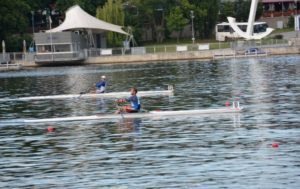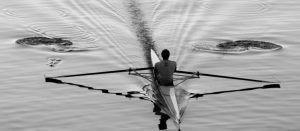We enjoyed this great review of the Wingfield Sculls event on the Hear the Boat Sing blog.
Tomorrow, Tuesday, 8 October 2013, will see the 173rd race for the Wingfield Sculls and also the 7th Women’s Wingfields. It is strange that an event that carries the grandiose titles of ‘The British Amateur Sculling Championship and Championship of the Thames’ should be so obscure, even within the sport of rowing and sculling. The Wingfields started in 1830 when Henry Colsell Wingfield presented a pair of miniature silver sculls ‘to be held by the best’ as long as they agreed to race in single sculls on his birthday, 10 August, ‘for ever’. The course is the 4 ½ mile (6.8 km) ‘Thames Championship Course’ (most famously used by the Oxford–Cambridge Boat Race) from Putney to Mortlake complete with tide, bends, shallows, rough water, wind, driftwood and other river users. Patrick Kidd of The Times has written: (The race is) above all… about athletes being taken out of their comfort zone. Baron Pierre de Coubertin, the founder of the modern Olympics, once said that rowing was the ideal sport because it was so hard for people to watch and thus worth doing purely for its own sake. In the Wingfield Sculls, that vision of glorious amateurism remains alive… Kidd also quotes Wade Hall-Craggs, winner (‘Champion’) in 1993 and the current Wingfield’s Secretary:
Top class rowers today are used to racing on plastic lakes where so many of the variables have been taken out and it is just a battle of limb and lung size. This is a different challenge.
Certainly the history of the race has numerous examples of winners who probably would not have beaten their opponents had they been on a straight, still water course. Racing on a ‘living river’ requires watermanship, something that cannot be learned on an ergo. Tim includes a great video of 2011 race http://www.youtube.com/watch?feature=player_embedded&v=aAEkpmO1ci4 Plus this lovely conclusion As a ’curtain raiser’ to this year’s races, following is a splendid newsreel film that I recently found online. It shows Richard Burnell beating Bertram Bushnell in the 1946 Wingfields. Of course, two years later ‘Bert and Dickie’ won a famous victory in the double sculls at the 1948 London Olympics. The bigger Burnell had previously beaten Bushnell earlier in 1946 in the Diamond Sculls at Henley but it is interesting to see that the highly competitive smaller man never gave up in this second encounter and sculled himself to the point of exhaustion. The final part of the film shows his limp body been lifted into the umpire’s launch at the finish. You could say that there were in fact two ‘Champions’ that day.






